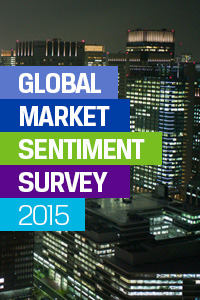Asia Pacific Market Outlook: Strong Growth, More Even Playing Field for Investors in 2015
It’s that time of the year again when pundits of all stripes — economic, financial, and political — start taking stock of the past 12 months and casting their gaze on the year head.
In Asia Pacific, CFA Institute members predict that the global GDP will grow modestly, an average of 1.91%, but tend to expect better prospects for their domestic markets. Those in China and India reckon that their local economy will expand 6.18% and 5.8%, respectively, while members in Hong Kong and Singapore anticipate 3.1% and 2.3% growth for their own home markets. Sentiments are more muted in Australia and Japan, where the expected growth is 1.6% and 0.9%, respectively.
The annual Global Market Sentiment Survey (GMSS) by CFA Institute polls our members (investment professionals) across 140 markets not only for their outlook for global and local markets, but also views on the strength and integrity of regulatory regimes and corporate governance.
While the US equity market — as with the previous year — continues to be the top equity investment choice (for 33% of all respondents globally), a post-election India is looking more attractive than in recent history. The Narendra Modi-led economy powered (from sixth last year) to share the second spot with China in this year’s survey; both major economies are favoured as the No. 1 choice for 9% of survey respondents. In contrast, Japan lost some shine, falling from third to a seventh placing.
How much stock, though, can one put on sentiments tapped in mid-October when oil prices were still relatively buoyant at US$95 and the Russian rouble hadn’t yet collapsed?
Indeed, while a number of “surprises” have reared their heads since October, throwing predictions out of whack, changes in the overall macro-environment were not entirely unforeseen. Survey respondents did highlight that political risks, including secessionist and nationalistic movements, would be the most underestimated risk that could threaten the health of global markets.
Impact of Political Instability
Within Asia, Hong Kong respondents are the most concerned about the impact of political instability, with half citing it as the biggest risk to the local market. Unsurprisingly so given the unprecedented scale of pro-democracy protests that thronged the business district of Asia’s leading financial capital for almost three months. About one in four Japan members are equally concerned with domestic political instability.
In India the story is quite the opposite. Just a year ago, before the country’s general election took place, political instability had reigned as the top risk factor for 80% of Indian respondents — the highest among all the markets surveyed. Post regime-change, this has dwindled to a negligible 2% in this year’s survey, reflecting to some extent general confidence in the stability of Modi’s government.
So what is an investor to make of an environment characterized by fickle market numbers and volatile developments, beyond the hoary chestnut of “uncertainty is the only certainty”?
Delve deeper into the survey and a silver lining can be glimpsed. The integrity of capital markets is improving slowly but surely. For three consecutive years, the proportion of respondents rating the level of integrity of global markets as “excellent” has risen gradually from 20% to 28%, while those who give a thumbs-down have shrunk from 26% to 17%. Survey respondents in Asia Pacific are among the most positive, with almost one in three believing that market integrity in 2015 will be better than in 2014 (compared to one in four in the Europe, Middle East, and Africa region and one in five in the Americas regions).
This rising approval rating underscores efforts in recent years by central banks and financial regulators around the world to strengthen regulatory frameworks and investor protection measures since the 2008 global financial crisis. At the same time, there is growing recognition among financial institutions and corporate leadership that ethical culture and governance standards need to be improved.
Within Asia Pacific, Japan and India in particular have introduced significant changes. Japan just released a final draft of its new Corporate Governance Code in December, and earlier in the year introduced the region’s first Stewardship Code in 2014 with almost 130 signatories. The world’s third-largest economy has been launching consultations to improve dialogue between company management and investors, exploring reforms that would increase the competitiveness of Japanese businesses and studying relevant capital markets changes to support these goals.
India finally passed a landmark new Companies Act in late 2013 after more than 50 years, with sweeping changes aimed at increasing transparency and disclosure levels, strengthening governance, compliance, and minority shareholder rights. In tandem, the Securities and Exchange Board of India (SEBI) is tightening enforcement.
The fact that more than half of Japanese survey respondents and more than one in three of those in India identified corporate governance as the most urgent regulatory action to improve investor trust indicates that regulators are on the right track, tackling gaps that the industry deems crucial.
Elsewhere in the region, Australia just released the final report of its Financial System Inquiry, a wide-ranging review that recommends, among others, harsher penalties for industry breaches, greater transparency on financial advice, and tougher bans on errant investment advisers.
Malaysia has also introduced a stewardship code (shortly after Japan), while Hong Kong’s Securities and Futures Commission continues to set the benchmark for strict enforcement.
What this all means — greater transparency, improved corporate governance, and better market integrity — is that markets are becoming fairer. In short, while market movements may be capricious and beyond control, investors in Asia Pacific — as with those in many other markets in the world — can at least take comfort that the playing field is slowly, but steadily, becoming more level.
If you liked this post, consider subscribing to Market Integrity Insights.

